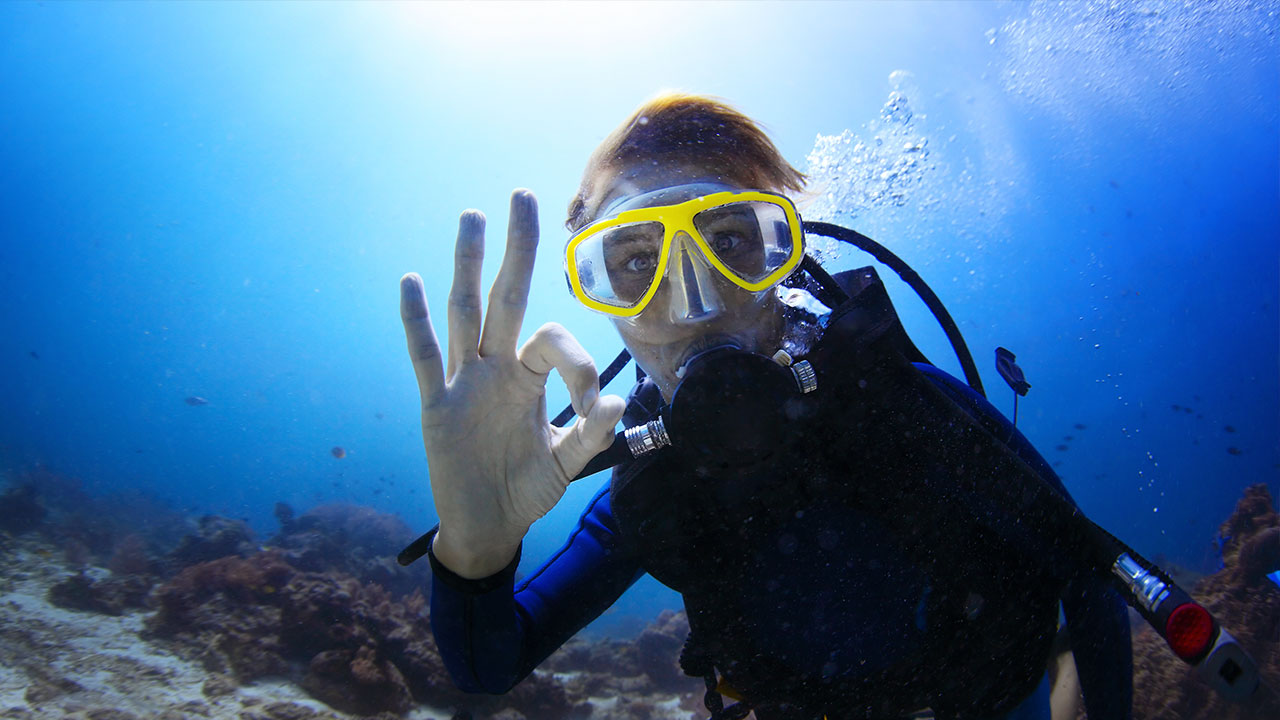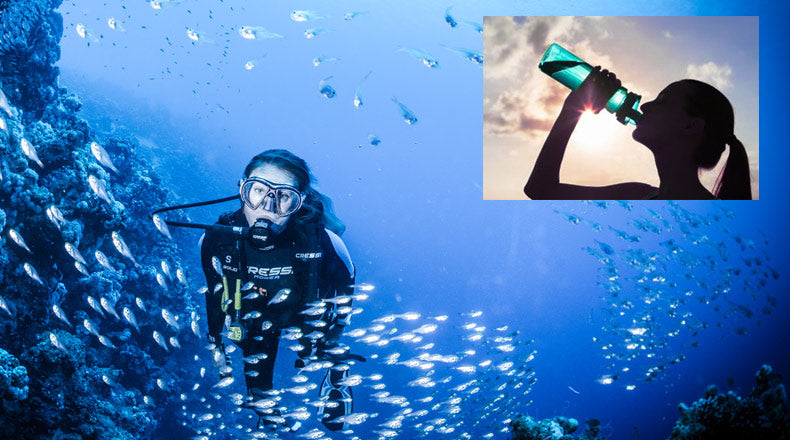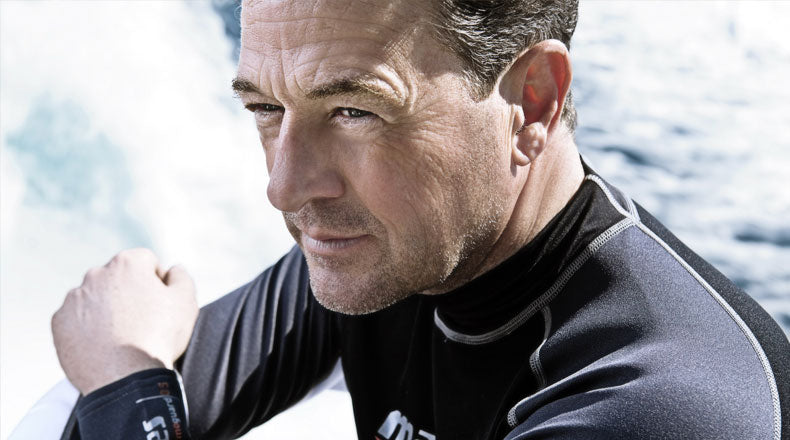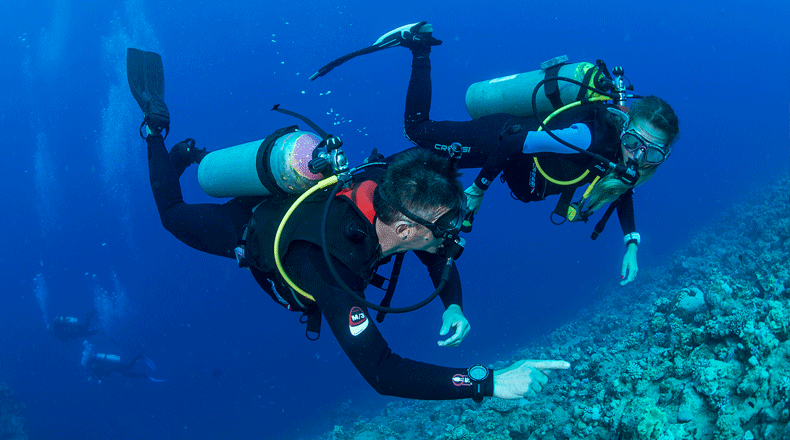Proper Hydration for Scuba Divers

When you’re diving, surrounded by tons of water, dehydration may be the last thing on your mind. Because it seems so counterintuitive, fluid intake is often neglected or reduced to just “good practice” among scuba divers. In reality, diving dehydrates you faster than many other activities. So, staying properly watered is vital to safe and healthy scuba diving.
To help you learn more about the issue, we will look at the different ways our bodies lose water during diving, explore how dehydration can negatively affect diver performance, and give you a few tips on optimum hydration.
How Does Dehydration Happen?
At the most basic level, dehydration is a condition that occurs when the loss of body fluids, mostly water, exceeds the amount that is taken in. This imbalance disrupts the usual levels of salts and sugars present in the blood, which can interfere with the way the body functions.
Usually, people think about hydration when they’re heavily exerting themselves and/or sweating profusely. But those things don’t happen all that often while scuba diving, so what makes divers dehydrate quicker than normal? Let’s take a look at a few factors that play a part.
1. Respiration. You may not notice this, but every time you inhale and exhale, you lose a little bit of water. Our lungs continuously work to humidify and warm up the air we breathe, and during the dive, that air is extremely dry, compared to anything we find in the atmosphere. This is deliberate, as the compressors that fill dive tanks are designed to remove almost all the moisture from the air they use. Moisture in the tanks can cause condensation, which, in turn, can lead to corrosion. As a consequence of breathing such dry air, however, we lose about double the amount of moisture normally exhaled.
2. Immersion Diuresis. This phenomenon, which is basically a technical term for “peeing in our wetsuits” affects every diver. Immersion, along with a water temperature that is colder than air, causes narrowing of the blood vessels in the extremities (arms and legs). As a result, more fluid floods back into the thorax. When the body recognizes the increase of blood around core organs, and the subsequent increase in blood pressure, it attempts to flush fluids by increasing urine output. That is the reason for the frequent need to urinate during dives and another factor contributing to increased fluid loss.
3. Sweating. Many of the popular dive destinations are in warm, humid climates, which means that, susceptible to large amounts of sun exposure, you may start sweating more than usual. Additionally, if you wear your wetsuit too early before the dive, you risk to make things even worse, since it prevents evaporative cooling. The longer you have that suit on out of the water, the more fluid and electrolytes you’re losing. So, try to wear it right before you’re getting ready to dive.
4. Vomiting. It is estimated that roughly 1 in 3 people suffer from motion sickness. So, nausea and even vomiting can plague many divers during their time spent on a dive boat. Not only is it embarrassing and uncomfortable, but vomiting can leave the body in a severely dehydrated state and lead to electrolyte imbalance.
The Effects of Dehydration on Divers
Although often downplayed, fluid regulation is one of the key aspects of diving physiology. Most people who have experienced dehydration will know that it’s unpleasant, but why is preventing it particularly important for scuba divers? To put it simply, dehydration increases the risk of developing decompression sickness.
Blood contributes to nutrient transport and gas exchange. When the body is dehydrated, the blood thickens and the blood flow is slowed. This means that the speed at which we eliminate absorbed nitrogen is reduced. So, even when diving within the limits of the tables or a computer, the dehydrated diver is at a greater risk of DCS.
This isn’t the only issue for scuba divers, though. Dehydration causes a number of other symptoms that are not very conducive to scuba diving and can reduce diver safety, including:
- muscle cramping and fatigue;
- increased heart rate and blood pressure;
- headache;
- weakness and exhaustion;
- reduced awareness;
- sleepiness;
- confusion.
Tips for Proper Hydration
Although dehydration can lead to a few unpleasant and even dangerous effects, preventing it is quite simple. Here are a few tips on how to stay properly watered.
- Don’t wait till you’re thirsty. Thirst is actually a poor indicator of hydration levels because by the time you become aware of your need for fluid it’s too late, you are already dehydrated. Hydrate early, a few hours or, even better, days before your dive trip.
- Drink small amounts at regular intervals. Too much water taken in at any one time just gets flushed through your system, so gradual hydration is the best approach.
- Water is your best option. If you don’t like plain water, you can add small amounts of fruit juice for flavoring such as squeezing a lemon wedge or an orange slice. Drinks containing caffeine, such as coffee, tea and some sodas are not recommended, since they can act against your hydration efforts.
- Avoid diuretics, especially alcohol. Alcohol suppresses production of the body’s anti-diuretic hormone leaving the person with a frequent need to urinate, speeding up the loss of fluid from the body, and leading to dehydration.
- Include a few sachets of rehydration salts in your first aid kit. If you’re suffering from seasickness, you need to be particularly aware of your hydration levels and electrolyte balance. Oral rehydration salts or electrolyte drinks will help to repair the damage if you lose a lot of fluid through vomiting. Even if you don’t normally get seasick, having them just in case is a good idea.
- Don’t forget to hydrate during surface intervals. Drink immediately after the dive, in order to restore fluid loss.
- Eat fruit and mineral rich foods. Fruit contains water, fructose and vitamins and is great both pre-dive and post-dive. Foods such as bananas, watercress, and mushrooms are high in potassium, and glycerol, so consuming them will also help with your hydration efforts.
- Carry a reusable, BPA-free water bottle with measurement markings. This is not only environmentally friendly, but will also help you gauge your water consumption.
- Utilize shade and cover up. This will help you prevent overheating, excessive sweating and sunburn.




